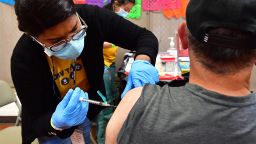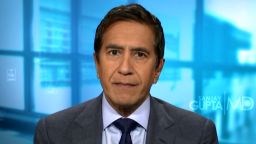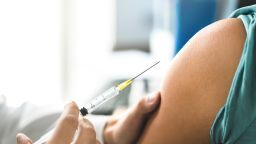With Thanksgiving just two weeks away, people who are eligible for an updated Covid-19 vaccine booster but still haven’t received the shot will need to roll up their sleeves Thursday to get as much protection as possible before the holiday.
Health officials are worried about a possible surge in respiratory illnesses this winter – including Covid-19, flu, RSV and rhinoviruses – and they are urging people who are not up-to-date on their Covid-19 shots to get vaccinated as soon as possible.
“The way it makes protection is to create these proteins, which we call antibodies, that then circulate in the bloodstream. Well, that can’t be done with a snap of the finger. There’s a biological process that takes place,” said Dr. William Schaffner, a professor in the Division of Infectious Diseases at Vanderbilt University Medical Center and medical director of the National Foundation for Infectious Diseases.
After getting the updated Covid-19 vaccine, that biological process can take about 10 to 14 days.
“So it starts right away, and gradually you get more and more of these antibodies into your bloodstream until, by about two weeks, you’re close to having a maximum,” Schaffner said. “The booster actually functions as a booster: You get an increase in antibody that’s faster than if you started from scratch.”
The rollout of the updated boosters has been sluggish, and there’s some urgency to building protection before gathering with family and friends for the holidays – the first festive season of the pandemic since most prevention measures, including masks and social distancing, largely became things of the past.
In October, White House Covid-19 Response Coordinator Dr. Ashish Jha said that getting the updated Covid-19 vaccine is “the most important thing” Americans can do for their health right now.
“The most important thing every American can do to reduce their likelihood of having significant, preventable health issues in the next three to six months is to go get an updated Covid vaccine,” Jha said. “Beyond that, we need to make sure that everyone over the age of 50 or otherwise with high-risk conditions gets treatments if they do get infected. We have treatments widely available.”
Uptake of updated Covid-19 booster remains slow
As colder weather arrives, people spend more time indoors and more holiday celebrations are planned, concern mounts among local health officials that there will be some uptick in the spread of Covid-19, flu and RSV in the weeks ahead, said Lori Tremmel Freeman, chief executive officer of the National Association of County and City Health Officials.
That concern is heightened even more because relatively few people across the United States have gotten the updated Covid-19 vaccine booster that is now available for those 5 and older.
“The message from the local health departments on this is that you should by now – if you are eligible and able – be getting your booster to protect you through the holidays,” Freeman said.
“The longer that time goes on since you’ve received your last booster, the more that your immunity wanes and the more susceptible you become again to getting sick with the virus,” she said. “So all those things together spell out that we have prevention to do right now as we get ready for the end of the year and the holiday season upon us.”
Less than 10% of the US population – about 26 million people 5 and older – has gotten an updated Covid-19 booster dose, according to the US Centers for Disease Control and Prevention. Coverage is highest among older adults: More than 1 in 5 seniors who got their primary series have also gotten an updated booster, compared with about 1 in 15 adults under the age of 30.
But the pace of uptake is relatively slow.
About 1 in 5 adults who have their primary series say they will probably or definitely not get the updated booster – a share that has been consistent since at least September, CDC data shows.
“What clearly will happen if we still don’t have widespread acceptance of this Covid booster is that the anticipated increase that we expect with Covid this winter will increase even more,” Schaffner said. “So we could make the season worse from the point of view of more serious disease.”
He added that with rising flu activity, an ongoing surge in RSV and the growing concerns around a possible increase in Covid-19 this winter, that is why it will be important to get vaccinated against Covid-19 and flu ahead of the holidays – and to make sure those around you will be vaccinated, washing their hands and staying home when sick.
“You could have a rule: You’re all welcome at the Thanksgiving table, for example, if you’re vaccinated and not only against Covid, against influenza, too,” Schaffner said.
Health officials say it’s fine to get the updated Covid-19 booster and flu vaccine at the same time.
Flu activity continues to ramp up
Flu is already spreading at high levels in some areas.
Last week, government health officials warned of an early and severe start to cold and flu season in the United States, saying they were closely monitoring hospital capacity and medical supplies and were ready to send help if needed.
“We suspect that many children are being exposed to some respiratory viruses now for the first time, having avoided these viruses during the height of the pandemic,” said Dr. Jose Romero, director of the CDC’s National Center for Immunization and Respiratory Diseases.
Across the United States, cases of RSV and influenza are increasing. At the same time, Covid-19 cases, which had been dropping, appear to have plateaued over the past three weeks, Romero said. A raft of new variants has been gaining ground against BA.5, the Omicron subvariant that caused a wave of illness over the summer.
Looking ahead, some vaccine makers, including Novavax and Pfizer and BioNTech, are developing two-in-one combination vaccines that will offer protection against both flu and Covid-19 in a single shot.
Last week, Pfizer and BioNTech announced that the first study participant has received a dose of their investigational flu-Covid combination vaccine in a Phase 1 trial. The vaccine candidate contains components of the companies’ updated Covid-19 booster and their investigational flu vaccine.
In October, Novavax announced that its Covid-19 and flu combination vaccine generated immune responses against coronavirus and influenza strains, showing “positive results” in a Phase 1/2 clinical trial. That trial is “the first of its kind” to evaluate a Covid-flu combination vaccine, the company said, and insights from the trial will inform a Phase 2 study that’s expected to start by the end of this year. The investigational vaccine is a two-in-one combination of Novavax’s Covid-19 vaccine and its quadrivalent flu vaccine candidate.
Moderna is also developing a combined flu and Covid-19 mRNA vaccine and another combination vaccine targeting flu, Covid-19 and RSV.
Get CNN Health's weekly newsletter
- Sign up here to get The Results Are In with Dr. Sanjay Gupta every Friday from the CNN Health team.
Health officials have long suspected that Covid-19 vaccinations will be needed annually in the future, similar to how seasonal flu vaccines are given each year.
A combination vaccine could be available as soon as for the next flu season, Freeman said, making it easier for people to roll up their sleeves on an annual basis.
“We may see as early as next year,” she said. “And that will help make it easier for people to make that choice to get both their flu and Covid either together in one vaccine or together at once wherever they’re able to get their vaccine.”
CNN’s Deidre McPhillips contributed to this report.









